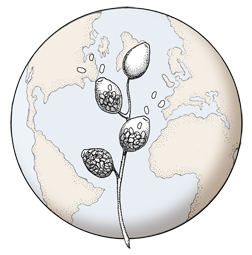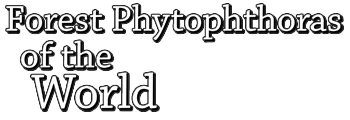References
. First evidence of genetic-based tolerance to red needle cast caused by Phytophthora pluvialis in radiata pine. New Zealand Journal of Forestry Science [Internet]. 2014 ;44:31. Available from: http://www.nzjforestryscience.com/content/44/1/31
. A crown rot of hollyhock caused by Phytophthora megasperma n. sp. J Wash Acad Sci. 1931 ;21:513-526.
. Evidence for the role of synchronicity between host phenology and pathogen activity in the distribution of sudden oak death canker disease. New Phytologist [Internet]. 2008 ;179:505–514. Available from: http://dx.doi.org/10.1111/j.1469-8137.2008.02450.x
. Pathogenicity of Phytophthora pluvialis to Pinus radiata and its relation with red needle cast disease in New Zealand. New Zealand Journal of Forestry Science [Internet]. 2014 ;44(1):6. Available from: http://www.nzjforestryscience.com/content/44/1/6
. Phytophthora diseases of Theobroma cacao. In: Improvement of cocoa tree resistance to Phytophthora diseases. Improvement of cocoa tree resistance to Phytophthora diseases. Montpellier, France: CIRAD; 2004. pp. 15–44.
. First Report of Phytophthora chlamydospora Causing Root Rot on Walnut (Juglans regia ) Trees in Turkey. Plant Disease [Internet]. 2016 ;100(11):2336. Available from: http://apsjournals.apsnet.org/doi/10.1094/PDIS-03-16-0306-PDN
. Victoria’s Public Land Phytophthora cinnamomi Management Strategy. [Internet]. 2008 :37 pp. Available from: http://lakeshub.com/wp-content/uploads/2013/04/Phytophthora_cinnamomi_Strategy-1.pdf
. In vitro leaf inoculation studies as an indication of tree foliage susceptibility to Phytophthora ramorum in the UK. Plant Pathology [Internet]. 2005 ;54:512–521. Available from: http://dx.doi.org/10.1111/j.1365-3059.2005.01243.x
. Phytophthora ramorum and Phytophthora kernoviae on naturally infected asymptomatic foliage. EPPO Bulletin [Internet]. 2009 ;39:105–111. Available from: http://dx.doi.org/10.1111/j.1365-2338.2009.02243.x
. First report of Phytophthora lateralis on Pacific yew. Plant Disease [Internet]. 1991 ;75:968. Available from: http://www.apsnet.org/publications/PlantDisease/BackIssues/Documents/1991Abstracts/PD_75_968C.htm
. Effect of host factors on the susceptibility of Rhododendron to Phytophthora ramorum. Plant Pathology [Internet]. 2010 ;59:301–312. Available from: http://dx.doi.org/10.1111/j.1365-3059.2009.02212.x
. Root-rot of sweet chestnut and beech caused by species of Phytophthora. Forestry. 1938 ;12:101–116.
. Transmission of Phytophthora ramorum in mixed-evergreen forest in California. Phytopathology [Internet]. 2005 ;95:587-596. Available from: http://apsjournals.apsnet.org/doi/abs/10.1094/PHYTO-95-0587
. Sudden oak death and associated diseases caused by Phytophthora ramorum. Plant Management Network - Plant Health Progress [Internet]. 2003 . Available from: http://www.plantmanagementnetwork.org/php/shared/sod/
. Forest type influences transmission of Phytophthora ramorum in California oak woodlands. Phytopathology [Internet]. 2011 ;101:492-501. Available from: http://apsjournals.apsnet.org/doi/abs/10.1094/PHYTO-03-10-0064
. Sources of inoculum for Phytophthora ramorum in a redwood forest. Phytopathology [Internet]. 2008 ;98:860-866. Available from: http://apsjournals.apsnet.org/doi/abs/10.1094/PHYTO-98-8-0860
. Pathways of movement for Phytophthora ramorum, the causal agent of Sudden Oak Death. The American Phytopathological Society Sudden Oak Death Online Symposium. 2003 .
Mitotic Recombination and Rapid Genome Evolution in the Invasive Forest Pathogen Phytophthora ramorum . mBio [Internet]. 2019 ;10(2). Available from: https://mbio.asm.org/content/10/2/e02452-18
. The occurrence of Phytophthora palmivora (Butl.) Butl. in soil in Ghana. Ghana Jnl. Agric. Sci [Internet]. 1974 ;7:37-41. Available from: http://gains.org.gh/articles/gjas_v7_1_p37_41.pdf
. Migratory passerine birds in Britain carry Phytophthora ramorum inoculum on their feathers and “feet” at low frequency. Forest Pathology [Internet]. 2020 ;50(1):e12569. Available from: https://onlinelibrary.wiley.com/doi/abs/10.1111/efp.12569
. Phytophthora alder decline: disease symptoms, causal agent and its distribution in the Czech Republic. Plant Protect. Sci. [Internet]. 2010 ;46:12-18. Available from: http://www.agriculturejournals.cz/web/pps.htm?volume=46&firstPage=12&type=publishedArticle
. Phytophthora alni causing decline of black and grey alders in the Czech Republic. Plant Pathology [Internet]. 2008 ;57:370–370. Available from: http://dx.doi.org/10.1111/j.1365-3059.2007.01718.x
. Annual and herbaceous perennial native Australian plant species are symptomless hosts of Phytophthora cinnamomi in the Eucalyptus marginata (jarrah) forest of Western Australia. Plant Pathology [Internet]. 2012 ;43(3):245–251. Available from: http://dx.doi.org/10.1111/ppa.12016
. Host removal as a potential control method for Phytophthora cinnamomi on severely impacted black gravel sites in the jarrah forest . Forest Pathology [Internet]. 2014 ;44(2):154 - 159. Available from: http://doi.wiley.com/10.1111/efp.2014.44.issue-2http://doi.wiley.com/10.1111/efp.12080
. Assessment of Australian native annual/herbaceous perennial plant species as asymptomatic or symptomatic hosts of Phytophthora cinnamomi under controlled conditions . Forest Pathology [Internet]. 2013 ;43(3):245–251. Available from: http://onlinelibrary.wiley.com/doi/10.1111/efp.12027/abstract



 ]
]